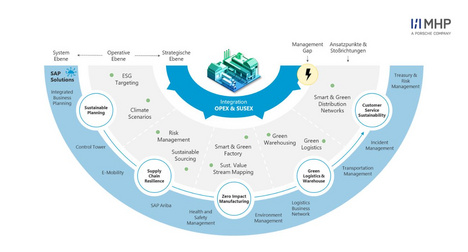
- Blog
- Published on: 13.07.2022
- 2:50 mins
How sustainability can be integrated into organizations and processes
Sustainable Operations
The pursuit of operational excellence (OPEX) is a decisive attitude embodied by successful companies. They constantly and holistically scrutinize the central processes along their entire value chain and continuously improve their effectiveness and efficiency. Building on this stance, the sustainable excellence approach (SUSEX) has now become established. Here, too, the processes are regularly evaluated – but with regard to the impact of the sustainability aspects.
MHP has established Horizontal Sustainable Operations as a cross-sectional function to focus holistically on the OPEX and SUSEX approaches within the field of supply chain consulting. This new unit enables an end-to-end analysis that is individually aligned to customer needs and that takes particular account of sustainability aspects to make companies fit for the requirements of the digital future.
Here, companies are accompanied during their transformation to sustainability and empowered to close the gap between formulating goals on a strategic level and implementing these into their operations. In addition, Sustainable Operations focuses horizontally on all steps along the value chain at strategic, operational and system level.
We recommend scrutinizing your own operational excellence to achieve sustainable excellence. How great a tie-in is there to the requirements of sustainable excellence? How resilient are the process and system worlds with regard to their topicality and crisis security?
Our service will provide advice addressing the levels shown above as we seek to answer these questions and more.
- Strategic level: Sustainability initiatives are increasingly seen as a competitive factor and an indispensable “license to operate.” As a strategic partner, we are at your side to support customers in aligning processes and the organization to add value. Sustainability is no longer just an abstract idea, but becomes a tangible concern for everyone when not only individual products, but entire companies are made sustainable.
- Operational level: At operational level, we address the five areas as shown. We provide holistic advice relating to the various areas of your supply chain through the targeted use of the expertise that we have gained from working on countless end-to-end projects. We combine the process view with the system view and enable seamless implementation and integration of sustainability processes into day-to-day business.
- System level: We use our expertise at system level to provide the best possible IT-based support to help turn the formulated strategies and defined business processes into a holistic approach. As an SAP business partner, we are always ahead of the curve and systemically shape your sustainability activities so that they are viable and transparent.
The MHP approach is characterized in particular by its holistic approach across all three levels – from formulating a strategy to anchoring processes at an operational level and putting application-supported processes into practice.
The example of the German Act on Corporate Due Diligence Obligations in Supply Chains (LKSG) shows how our sustainable operations approach works in practice. From 2023, companies in Germany with more than 3,000 employees will be required to continuously monitor their activities and those of their suppliers for specific human rights and environmental violations, regardless of national borders or local laws.
Sustainable Operations has taken on this challenge and has already been able to successfully put measures into place to ensure that our customers are compliant. The current status quo of the supply chain with regard to the regulatory requirements of the LKSG was analyzed, documented and adapted within the framework of an implementation concept. The adapted processes were communicated by the change management team and implemented in the organization; the IT adaptations were implemented at application level so that the alterations required to conform to the LKSG could be viably put into practice. In addition, a continuous monitoring process was established to ensure that companies remain compliant with the LKSG over the long term.
As you may well have deduced from this article, the time to transform your supply chain is now. Combining value creation, digitalization and sustainability will give you a decisive competitive advantage. Not only because customers, investors and business partners demand it, but also because increasingly complex products, innovations and global markets demand these changes with sustainability in mind.
